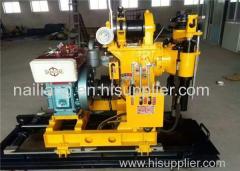
Diesel Engine Geological Drilling Rig Machine 22HP Crawler Mounted
| Min. Order: | 1 Set/Sets |
|---|---|
| Trade Term: | FOB,CFR,CIF,DAT,FAS,DDP,DAP,CIP,CPT,FCA,EXW |
| Payment Terms: | Paypal, L/C, D/P, D/A, T/T, WU, Money Gram |
| Supply Ability: | 2000 sets per year |
| Place of Origin: | Hebei |
Company Profile
| Location: | Shijiazhuang, Hebei, China (Mainland) |
|---|---|
| Business Type: | Manufacturer |
Product Detail
| Means of Transport: | Ocean, Air, Land |
|---|---|
| Price :: | Negotiation |
| Payment Terms :: | T/T, Western Union |
| Supply Ability :: | 2000 sets per year |
| Delivery Time :: | 7-12 days |
| Usage :: | Water Well,exploration |
| Power Type: | Diesel |
| Voltage: | 220V/380V |
| Application: | Water Well drilling |
| Drilling depth: | 200 meters |
| Length of drill pipe(mm): | 3m |
| Production Capacity: | 2000 sets per year |
| Packing: | Wooden box |
| Delivery Date: | Within 15-20 days |
Product Description
Diesel Engine 22 HP Crawler Mounted GK 200 Geological Drilling Rig Machine Equipment
GK 200 Geological Drilling Rig Introduction
The drilling rig is applicable to the engineering geological survey of industrial and civil construction, railway, hydropower, transportation, bridge, dam foundation and other buildings; Geological core drilling and physical investigation; Drilling of small grouting holes, geothermal holes, blasting holes and various concrete detection holes; Small water well drilling and small foundation pile hole.
GK 200 Geological Drilling Rig Tech Information
Drilling depth | 200m | |
| Maximum open hole caliber | 300mm | |
| End hole caliber | 75mm | |
| Drill rod caliber | 60mm | |
| Drilling angle | 90°~75° | |
| Drill weight (No include power) | 975kg | |
| Unity machine dimensions | 1433×697×1273m | |
| Spindle | ||
| spindle speed | 64 128 287 557r/min | |
| Spindle stroke | 450mm | |
| Winch | ||
| Max.single line hoisting capacity | 2400kg | |
| Single line lifting speed | 0.41,0.82,1.64m/s | |
| steel wire rope caliber | 13m(35m) | |
| Mud pump | ||
| Type | Horizontal single urn twin-action | |
| Displacement | 170/150L/min(diesel or electromotor) | |
| Diesle engine | ZS1115 16.2kw 2200r/min | |
| Electric motor | Y160M—4 11kw 1440r/min | |
GK 200 Geological Drilling Rig Advantages
1) It has a hydraulic feeding structure to improve the drilling efficiency and reduce the labor intensity of workers.
(2) The drilling rig is equipped with upper ball clamp clamping mechanism and hexagonal active drill pipe, which can reverse the rod without shutdown and is easy to operate.
(3) It is equipped with a hole bottom pressure gauge to indicate the pressure, which is convenient to master the situation in the hole.
(4) The handle is centralized and easy to operate.
(5) The base is equipped with an oil cylinder, which can move back and forth for easy lifting and lowering of drilling tools
(6) The drilling rig has the advantages of compact structure, small volume, light weight, strong decomposition and easy relocation. The loading form is trailer type, crawler type and disassembly. It is suitable for working in plain or mountainous areas.
Precautions for courtyard drilling
1. Consider whether the well depth is reasonable
We should first investigate whether there are cables, sewers and other facilities under the ground, and avoid unnecessary damage.
2. Convenience, health and other issues should be considered.
After drilling the well, find some charcoal and throw it into the well with a bag and press it at the bottom of the well to absorb foreign toxins. After having water, you can put a few small fish down, which is a good way to test the safety of water quality.
3. The well should not be too deep. It should be above the ground and should be blocked with bricks and stones. It is better to have a cover, so as to prevent dirt from falling in, make people feel safer and avoid unnecessary dangers.
Sampling Procedure
Divide the field into different homogeneous units based on the visual observation and farmer's experience.
Remove the surface litter at the sampling spot.
Drive the auger to a plough depth of 15 cm and draw the soil sample.
Collect at least 10 to 15 samples from each sampling unit and place in a bucket or tray.
If auger is not available, make a 'V' shaped cut to a depth of 15 cm in the sampling spot using spade.
Remove thick slices of soil from top to bottom of exposed face of the 'V' shaped cut and place in a clean container

